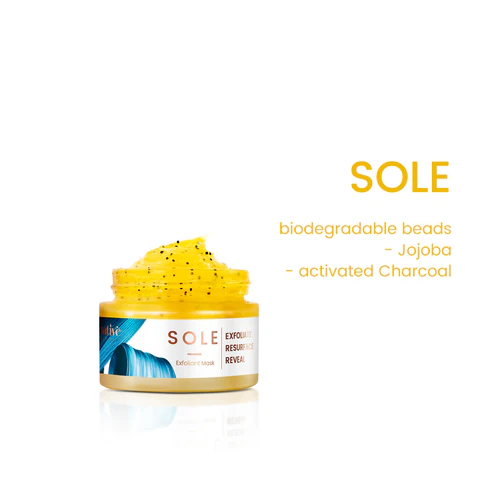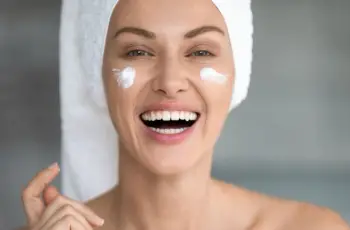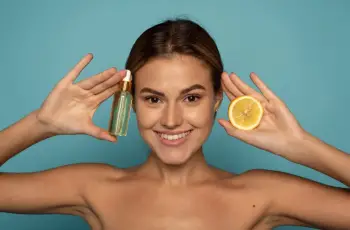
Can some cosmetic ingredients pollute our oceans and cause coral reef bleaching?
The short answer is sadly yes.
Besides the huge problem of excessive plastic packaging ending up in our waterways and oceans, we have had in the past years a few clear signs that the issue is way deeper than packaging, and this is due in small part to the beauty and personal care industry.
Let us take a closer look at some skincare ingredients potentially polluting our oceans and what less harmful alternatives are currently available.
UVA / UVB Filters
Sunscreens are chemicals or minerals that absorb or reflect ultraviolet sunlight radiation; they are widely used in many skincare products to protect the skin from UVA and UVB rays. Sunscreens are classified in:
Organic filters (= chemical) They absorb radiation and then dissipate the absorbed energy.
Inorganic filters (= mineral) They reflect UV radiation.
The issue
Both organic and some inorganic filters can reach the marine environment directly (wash-off from the skin when swimming) and the coral reef.
Organic UV filters have been found in several aquatic organisms from marine invertebrates to mammals and even dolphins! Over time, they accumulate in the muscle tissue and fat deposits of these animals and therefore are likely to enter marine food chain.
Nano-Zinc Oxide, an inorganic mineral filter, is toxic for marine life such as algae, sea urchins and other marine organism.
Some UV filters can cause coral bleaching at extremely low concentrations. It is well known that coral mortality main cause is linked to increased water temperature; however, organic UV filters accelerate both coral disease and mortality because they produce significant amounts of Hydrogen peroxide and even phytoplankton (a key element of the marine food chain) can be affected. In 2020, on average, 15% of coral cover remains bleached white. *
The solution
Avoid sunscreens formulated with:
❌ oxybenzone
❌ avobenzone
❌ octocrylene
❌ enzacamene
❌ homosalate
❌ nano zinc oxide
Prefer sunscreens formulated with:
👉🏻 non-nano zinc oxide
👉🏻 non-nano titanium dioxide
Plastic microbeads
Plastic Microbeads are used in personal care products such as:
Body Scrubs
Face Exfoliants
Bubble Bath / Shower gel
Soaps
Glitter
The issue
Plastic Microbeads are too small to be trapped in the sewage treatment plants. They enter the waterways via domestic drainage systems and then get transported to the oceans.
Depending on the type of plastic and density, microbeads either accumulate on the seabed or float on the sea surface. Full plastic degradation can take hundreds of years (take PET, which degrades in 450 years) so invisible plastic microparticles can be ingested by aquatic organisms.
The solution
Buy cosmetics made with natural and biodegradable microbeads alternatives such as:
biodegradable hydrogenated oils waxes like jojoba beads
grounded kernels or shells (coconut, apricot, walnut…)
diatomaceous earth
charcoal
Triclosan (TCS)
In the past years, the use of hand sanitizers and antibacterial hand soaps (especially from the onset of Corona Virus in early 2020) has increased dramatically.
One inexpensive antibacterial ingredient and preservative largely used in personal care products, Triclosan (TCS), is also on the watch list of marine pollutants. It is used for:
antibacterial hand soaps
anti-acne products
sanitizing hand gels
antibacterial wipes
cleaning and sanitizing products
The issue
TCS is discharged via domestic sewage; during the wastewater treatment process, it can also be converted into chlorinated derivatives, even more toxic compounds.
In high concentration, TCS accumulates in algae, marine mussels, and marine mammals and it is considered toxic.
The solution
Some essential oils have good antibacterial properties (Skin application: Tea Tree, Lemon Tea Tree, Lemongrass, Peppermint, Manuka, Kanuka, Fragonia, Orange, Palmarosa. Inhalation: Thyme, Clove, Eucalyptus, Oregano, Cinnamon) **
Silver Citrate and Citric Acid
Alcohol (isopropyl alcohol)
At Native Essentials being sustainable and eco-friendly is important: from the sourcing of each ingredients to the formulations and packaging. We will never use any natural ingredient that is not from a sustainable source, that is not thoroughly tested, and that is not 100% safe for the environment, including our oceans.
SOLE is an exfoliant made with fully biodegradable (hydrogenated) Jojoba beads and activated charcoal beads.
KORU is a gentle antibacterial dry face oil formulated with essential oils (Lemon Tea Tree, Manuka, Kanuka, Lemon Myrtle, Fragonia)


